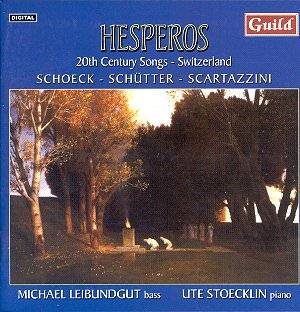This CD consists of twelve songs, settings of the great
Eichendorff and written during the very darkest of times in 1917-18,
by Othmar Schoeck. Seven selected songs written by Meinrad Schütter
at times between 1931 and 1994 and taken from various song-cycles and
finally the ‘Sappho Fragments’ completed earlier this year (2002) by
Andrea Scartazzini. So the recording gives us a fascinating over-view
of modern lieder by three of Switzerland’s leading 20th and
21st Century composers.
Michael Leibundgut is a young and very impressive talent.
He has a rich and plaintive bass voice with a wonderful profundo register
when needed and a beautiful top voice, which is perfectly at ease above
the clef. His middle register rings sonorously and his performance is
often breathtaking in its musicality and, at times, virtuosity, although
more vocal colour is needed in the Schoeck songs. But supporting a fine
singer there is always a fine accompanist as here. Never should the
influence of the experienced Ute Stoecklin be overlooked; they make
a fine team.
It seems to me to be quite true, as Ute Stoecklin points
out in the very useful booklet notes, that a line of lieder composers
can be clearly drawn from Schubert and Schumann, through Brahms into
Wolf and Richard Strauss and then into Othmar Schoeck who, although
his output is little known in Britain is very highly regarded by Germanic
singers and quite rightly too. I cannot quite feel that the path should
follow into Schütter’s work but given time Scartazzini, if he chooses
to go down that line, may be included.
Schoeck is a Romantic composer and Eichendorff a Romantic
poet although his dark vision of the beautiful first song ‘Loneliness
of the forest’ using the forest as a backdrop to seeing the mother of
God watching over us, is almost surreal. Schoeck does not attempt music
that stretches tonality and certainly not in the way his contemporary
Schoenberg was doing at that time, think of Erwartung (1909),
but he knows how to write lyrically. It’s worth noting in passing that
Schoeck composed about four hundred songs. Here songs 7-12 were written
first in 1917, the first six coming from the following year. The melodic
line is crucial to an understanding of all of his music.
Meinrad Schütter is a prolific composer in all
genres but he obviously relishes the voice and is very sensitive to
text. Here we have a very wide variety of poets including Rilke’s (d.1926)
‘Herbsttag’ (Autumn Day) and Albert Thelan (d.1989) Nachliche Lampe
(Nocturnal lamp). As you listen through the songs, composed over an
extraordinary sixty year span, the changing language of this composer
(whom sadly I have not met before) becomes fascinatingly apparent. We
are lead from the late-romantic ‘Dumonda’ (Request) of 1931 through
to two songs from his cycle of 1994 ‘Chanzuns da la not’ with its partly
spoken and partly sung lines and its totally independent piano part.
These songs and the earlier ones like ‘Dumonda’ use the fascinating
Rhaeto-Romanic language, a Romance language which seem to have a common
link with Italian, Rumanian and French to name but three. It has been
an official language of Switzerland since 1936.
Andrea Scartazzini takes Sappho whose work mainly survives
in only a fragmentary state. I was much impressed with this rather austere
cycle of six songs. The third, ‘Hesperos du bist der’ (Hesperos is the
morning star) gives the CD its title. Evoking a far-off world, the composer
accompanies a windy, folksy yet chromatic line, sung sotto voce
by Leibundgut, by sounds from the inside the piano. The next song ‘The
moon at dusk’ begins with the extreme high register of the instrument
and, I think, its bottom note acting as an intermittent ostinato. The
stuttery word-setting wanders nervously through the texture and just
as its confidence is restored the fragment is over. The next song requires
some discreet falsetto vocal work and the last some impressively deep
humming before the words ‘It stood by my bedside’. The song’s sudden
ending is also impressive.
The CD comes with texts, excellently translated, and
essays also in French and German. The recording is vivid and immediate.
Well worth investigating.
Gary Higginson


![]() Michael Leibundgut (bass)
Michael Leibundgut (bass)
![]() GUILD GMCD 7254
[55.23]
GUILD GMCD 7254
[55.23]